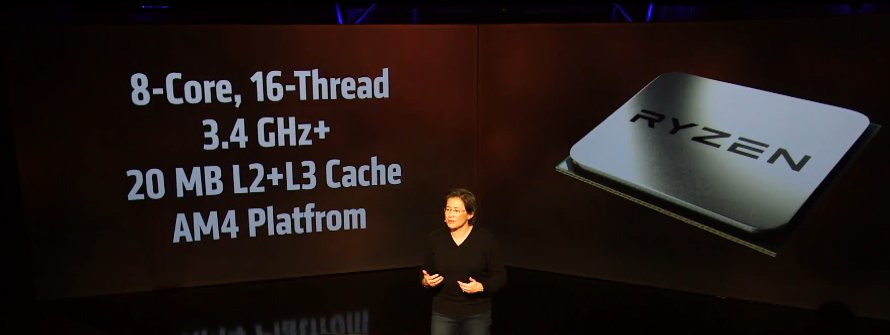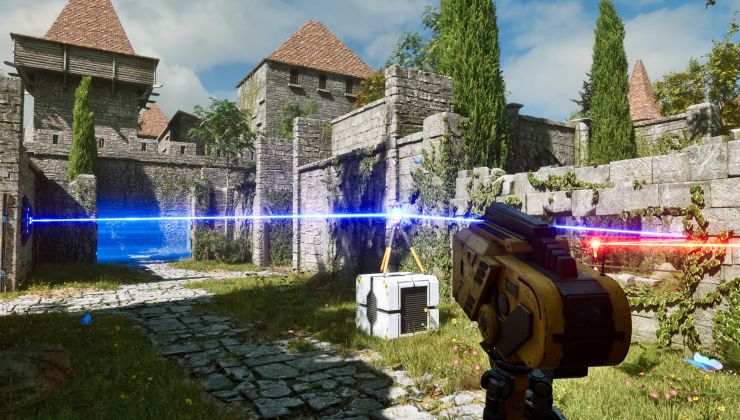AMD have released more information about Zen, but the official name is now AMD 'Ryzen' (pronounced as Rye-zen). Their livestream event just finished, so here's a quick overview for you.
They announced that Ryzen 'Summit Ridge' will be on their AM4 platform, which will support DDR4 memory, USB 3.1 v2, NVMe storage and PCIe v3. It will have 8 cores, 16 threads with a base clock of at least 3.4 GHz+ (they may tweak that higher at release). It will boost higher, but they haven't said how high. This is wrapped up in a neat 95W TDP package, so that's not bad at all for what it does.

It's worth noting, that this is their high-end, so their lower end which hasn't really been talked about will differ.
They will come with 'SenseMI', which includes a bunch of thermal and voltage sensors. With this feature, it will apparently be able to adapt the performance based on heat conditions at lower voltages, so if you have a really good cooler for example it can maximise the performance for you. This also includes a smart prefetch and other goodies to help boost performance.
It will be available sometime in Q1 of 2017 for the desktop chips (Q2 for server chips), but hopefully we will see a more solid date soon.
The AMD CEO claims they have hit their goal of 40% improvement over their last generation's IPC (instructions per cycle). This is a massive improvement, and if really true it will put AMD firmly back on the map for a lot of people.
They did three tests against an Intel 3.2GHz 6900K, where the AMD chip came out just about on top, which is pretty impressive. See the linked video in this tweet:
Using Blender, we put Ryzen up against it's biggest competitor, clock for clock, at #NewHorizon. The results speak from themselves. pic.twitter.com/0glPor1jpf
— AMDRyzen (@AMDRyzen) December 13, 2016
I still think it will be more interesting to see real-world benchmarks done by others, so we can remove any marketing speak and just see hard numbers. I am excited to see them though, as Ryzen could really be the game-changer we've been needing.
What do you think, sound good to you?
If people can clock their lower end Zen CPU's at ~4.5ghz (for boost, or if it auto does it) then I will be happy with getting a AMD CPU. Still not sure on what to expect from this auto-clocking business, makes no sense stating a TURBO speed if the thing clocks up to whatever it wants/needs anyway?Well, most processors do it (semi-)automatically nowadays, anyway. And you will still have manual control over it.
Normally you'd find the top stable clocks and volts for the CPU then let it apply those through the typical clock throttling method, having the CPU 'decide' itself on what it can achieve doesn't seem sensible or even stable!
To me, it makes more sense, after all, the processor is in the best possible place to determine how much headroom it has.
I bet you're not red doing your over locking calibration every time there is a few degrees change in your room, or after dusting your computer, for example. This is intended for maximizing performance and power efficiency at *any* given time. Plus, it's also kind of a free boost for anyone who doesn't feel like playing with his OC settings. I did that a long time ago, but nowadays, I just find it's not worth the effort. Plus, I have been burned by (almost) invisible errors in the past (errors in computations, random errors/crashes). Overall, I trust the processor better than myself when it comes to tuning its operational parameters.
Oh, and AFAIK, Intel's turbo boost is automatic too (it disabled some cores to give a single-threaded workload some frequency boost, IIRC). So, it might make sense, here.
can someone explain me, why the hell their logo take so much to render?
they put countless polygons on a plane just to make it take more time to render?
why not show an impressive demo like try to render some frame of sintel at any resolution?
the other demos where more impressive, the blender demo made blender looks dumb.
Have you used Blender's renderer? Especially the new one, Cycles. It's pretty realistic (ray-tracing). Lighting computations in particular are ressource intensive, and most of the time, that's more or less regardless of the complexity of the scene (though post-processing or complex feature can also have a big impact), but more dependent on resolution, anti-aliasing, . The degree of realism here is yeeeeaaars ahead of video games (i am still longing for real time raytracing). Plus, you would also have a hard time playing a complex 3D game just on the CPU, just saying :)
Plus, this is a pretty important benchmark for any 3D artist, there are not only gamers in this world.
To put things into perspective, IIRC, for the movie Avatar, each frame took around 24h to compute on a very big GPU farm...
Plus, this is a pretty important benchmark for any 3D artist, there are not only gamers in this world.
To put things into perspective, IIRC, for the movie Avatar, each frame took around 24h to compute on a very big GPU farm...[/quote]
the issue is, its an accurate simulation but the end result dont look good anyway, they didnt make realistic materials, they did it for the other program wich is realtime, so you have acurrate raytrace on materials that look fake and not so acurate on materials that look real.
it made blender looks like a piece of crap for those who arent behind the details Behind the scenes
AMD basically butchered AM3+ FX processor line (no Steamroller or Excavator upgrade) thus making FX-83XX the EOL processors.
Granted, FX-8320E with overclocking to 4 GHz is quite impressive in multithreaded tasks (like CFD, ray-traced rendering or mass video converting) and almost on par with Core i5-6400 for basically 2/3 of its cost. But that's the best AMD can offer...
I'm highly sceptical about this 'Zen' generation. AMD can screw CPUs in favor of APUs yet again. Needless to say, my current CPU is sufficient for the next 5 years or so.
Ryzen had 35 sec
mine:
FX-8320@4,4ghz ~1:23
Mine FX-8320E@3,6GHz ~1:41
Last edited by Alm888 on 14 Dec 2016 at 4:24 pm UTC
Last edited by Alm888 on 14 Dec 2016 at 4:24 pm UTC
Last edited by natis1 on 14 Dec 2016 at 7:46 pm UTC
Too bad they are a little late to the party...
AMD basically butchered AM3+ FX processor line (no Steamroller or Excavator upgrade) thus making FX-83XX the EOL processors.
Granted, FX-8320E with overclocking to 4 GHz is quite impressive in multithreaded tasks (like CFD, ray-traced rendering or mass video converting) and almost on par with Core i5-6400 for basically 2/3 of its cost. But that's the best AMD can offer...
I'm highly sceptical about this 'Zen' generation. AMD can screw CPUs in favor of APUs yet again. Needless to say, my current CPU is sufficient for the next 5 years or so.
Ryzen had 35 sec
mine:
FX-8320@4,4ghz ~1:23
Mine FX-8320E@3,6GHz ~1:41
There is a sample setting that can be changed that can drastically reduce the time needed to render the image. No one is sure how many samples AMD had set for their benchmark. The default of 200, I score 1:14 with my 8320 @ 4.5 but at 100 samples I scored 00:37. There is a big forum discussion about it on techpowerup.
There is a sample setting that can be changed that can drastically reduce the time needed to render the image. No one is sure how many samples AMD had set for their benchmark. The default of 200, I score 1:14 with my 8320 @ 4.5 but at 100 samples I scored 00:37. There is a big forum discussion about it on techpowerup.
Actually, there are a lot of settings. By reducing the number of samples per pixel to 100, enabling spatial splits and probabilistic path termination I've "upgraded" my CPU, reaching 00:49. ^_^
But I assume we are supposed to use presets from the file...
P.S. [email protected]... quite hot! Literally. My cooling system does not allow me to go higher than 3.6GHz (due to thermal throttling).
P.P.S. It is 1:31 on [email protected]
Last edited by Alm888 on 14 Dec 2016 at 8:35 pm UTC
I am not a blender expert by any stretch of the imagination. My temps are ok, I get by on a lower voltage than most people I have seen with an 8320 at 4.5. I get by on 1.32V CPU temp will peak around 55-56C under prime95 and 70C on the CPU socket. I am using a Phanteks TC-14-PE.
I heard in order to reach 4.5GHz for FX-8320E it takes 1.5V+. This aspect coupled with my meager cooling system (something like DEEPCOOL ICE EDGE Mini FS V2.0, I've forgotten exact model) and unoptimal MB (ASRock 970 Pro3) strongly dissuade me against extreme overclocking adventures. :-(
Mine :I score 1:14 with my 8320 @ 4.5Ryzen had 35 sec
mine:
FX-8320@4,4ghz ~1:23
Mine FX-8320E@3,6GHz ~1:41
AMD-A4-3305M @2.5Ghz, ~9:50 :D

Last edited by OhYash on 15 Dec 2016 at 8:04 am UTC
The blender render performance is significantly worse in Windows, I rendered at 2:24 in windows vs 1:14 settings appear to be the same.
we should show something like that for more people, and imagine how fast the demo would have being if it where on linux
So... The bulldozer modules are very much alive with another name; instead of modules, now they are called cores...
The FX 8xxx was four cores and eight threads...
And now we have eight cores and sixteen threads with less TDP than the FX8xxx... Good sign! :)
I wonder how many FPU per core we have...
No this is not ture, AMD use SMT architecture for Zen instead of CMT which used for previous generations.
[url=en.wikipedia.org/wiki/Zen_(microarchitecture)]Zen (microarchitecture) - Wikipedia[/url]
I hope I can build a new system with Ryzen and Asus Crosshair VI (hopefully!) mobo for the next year.
Last edited by Delayline on 17 Dec 2016 at 9:07 pm UTC








 How to set, change and reset your SteamOS / Steam Deck desktop sudo password
How to set, change and reset your SteamOS / Steam Deck desktop sudo password How to set up Decky Loader on Steam Deck / SteamOS for easy plugins
How to set up Decky Loader on Steam Deck / SteamOS for easy plugins
See more from me